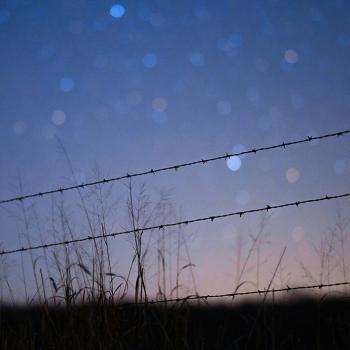That is another reason why the understanding of our life "In God" is so powerful. We find crucial connections where nothing is left out and no one is left behind. It is a faith that beckons us to the big, open story of God.
Poetry has a way of conveying big ideas with intensity and grace. The Gospel of John opens with just such a poem. While the other Gospels begin with birth lineages of Jesus, John's poem is structured much like one of the creation narratives from Genesis. The structure and vibe are big in scope, embracing the calling of all people, not just a select chosen people:
In the beginning was the one who is called the Word. The Word was with God and was truly God.
From the very beginning the Word was with God. And with this Word, God created all things.
Nothing was made without the Word. Everything that was created received its life from him, and his life gave light to everyone.
The light keeps shining in the dark, and darkness has never put it out.
The Word became a human being and lived here with us. We saw his true glory, the glory of the only Son of the Father.
From him all the kindness and all the truth of God have come down to us.
Here, the life of God is framed not as a small, tangential story intended for a select few, but the Big Story meant to include all. It's the story of all things having the same origin — the life that gave light to everyone.
The In-God reality, in which we live, move, and have our being is the biggest story possible. Over the last few years, when I have talked to people about this great interconnected story, I've heard a frequent concern. While people like the idea of living "in God," it could cause the loss of the personal nature of faith.
As a friend put it, "'In God' sounds kind of Buddhist, like the individual doesn't matter. I have nothing against Buddhists, but the story of Jesus has always been meaningful for individual people and that really matters to me. I want to have a personal relationship with God and not just be connected to others and to the Universe."
I too worried that taking on the "In God" understanding would cause me to lose all sense of personal identity. Or that God would lose meaning for me altogether, merging into a nebulous, faceless Divine. I was not interested in embracing a soupy, vague, gray amalgam of humans, Deity, and interconnected oneness with the Universe.
The Big Story of living "In God" can easily be misheard as a transcendent reality that extinguishes the importance of each human life. If we are all "In God" then what does it matter what I do? What contribution can I make that will stand out as having come from my individuality, my unique combination of talent and abilities and initiative? If everything gets lumped together "In God," what's the point of taking risks and trying to make a difference in the world?
Surprisingly to me, just the opposite has happened. I have found that seeing each person as a full human being living "In God" has heightened the value of every person and his or her unique qualities and contributions to the whole. Rather than having to live with a complex system that has varying categories of "these people" and "those people" and "we people," each person is free to be a particular expression. Fortunately, we are always finding ways to make sense of the particular in the midst of the whole.
Understanding the particular in relation to the whole is a dilemma of life itself. We have to consider it to make sense of our simple and short lives in light of human history. We cheer on each child born, even though on the planet there are four babies born every second. We honor every life as valuable and will go to incredible extremes to save a life even though more than 108 billion people have lived. We understand both the whole and the particular, or as the poem puts it, light and life.




